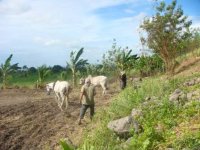Yeah don't even bother trying to get into grapes man, I live in wine country (16 years) and the regulations are pretty insane. Land suitable for planting here goes for over 100K an acre, more if you want it near a road for a winery.
Organic indoor basil or strawberries, or find a niche crop you can supply to a local supermarket chain. Go ask the produce manager what they need more of!
Organic indoor basil or strawberries, or find a niche crop you can supply to a local supermarket chain. Go ask the produce manager what they need more of!




